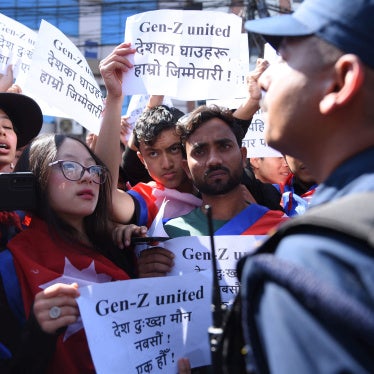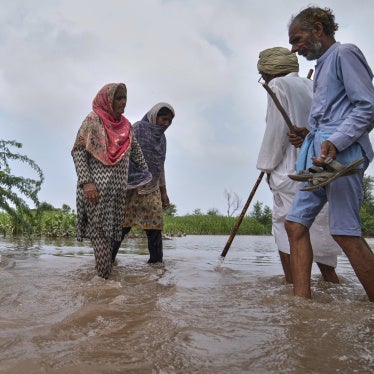(Berlin) The incoming German government should become a force for human rights protection worldwide, Human Rights Watch said today. Germany must take a stronger position against human rights abuses in major countries like Russia and China.
To encourage the German government to expand its role as an advocate for human rights, Human Rights Watch has opened an office in Berlin.
“Germany has a special role to play in defending human rights all over the world,” said Marianne Heuwagen, Germany Director of Human Rights Watch “The German government needs to use its close relationship with countries like Russia to promote respect for human rights.”
In particular, the German government should focus on protecting human rights in countries like Russia, China, Uzbekistan and Sudan.
Russia: The incoming German government should use the special German-Russian relationship to pressure Moscow to end the forced disappearances, rape, torture and extrajudicial executions by its federal troops in Chechnya. Such atrocities are committed on a daily basis there. Chechen forces are also committing grave human rights abuses in the region.
As part of the European Union, the German government should press Russian authorities to undertake credible and transparent investigations of atrocities in Chechnya, and institute a genuine accountability process for crimes committed by Russian forces in the region. Germany should also closely monitor the threats to freedom of expression and other basic human rights in Russia today.
Uzbekistan: As part of the European Union, Germany has insisted that the Uzbek government halt its campaign of increasing repression against human rights defenders and civil society activists in the wake of the May 13 massacre in Andijan. Germany has also demanded an international inquiry into the Andijan violence and imposed a set of EU-wide sanctions in response to President Islam Karimov’s refusal to conduct such an inquiry.
Today, Berlin should seek political support from key non-EU countries like Russia for an independent international investigation into the Andijan massacre. In addition, the German government should conduct continuous monitoring of post-Andijan trials.
China: Germany should increase its efforts to improve human rights conditions in China. In particular, the German government should convey the message that economic progress and respect for human rights and the rule of law go hand in hand. Independent courts are crucial for the resolution of business disputes, and a free press is essential for tackling corruption and as well as health crises such as SARS, HIV/AIDS and avian flu. The Chinese government routinely harasses, imprisons, mistreats and tortures its political opponents, including activists from ethnic groups who call for greater autonomy. Freedom of expression on the Internet is under growing threat.
When Chinese President Hu Jintao visits Berlin in mid-November, the German government should raise the issues of protecting freedom of religion and expression, strengthening civil society, and ending censorship of the Internet. In addition, Germany should not advocate for an end to the EU arms embargo put in place after the 1989 Tiananmen massacre until the Chinese government undertakes transparent, credible investigations into the killings and holds those responsible for the massacre accountable.
Afghanistan: As part of the International Security Assessment Force in Afghanistan, Germany should enhance its political, technical and financial support to improve security conditions in the country even further. Warlords and armed factions dominate most of the country and routinely violate the human rights of the most vulnerable groups: women and girls. In the south of the country, civilians are increasingly caught in the middle of the conflict between Taliban and the U.S.-led coalition that supports the central government.
The German government should work to establish a Special Court in Afghanistan to hold perpetrators of grave human rights abuses accountable and remove them from positions of power, especially as more than half of the newly elected members of Afghanistan’s parliament have links to armed factions or records of human rights violations. Germany should also use its position of influence to press the United States to comply with the Geneva Conventions and basic human rights standards in its treatment of Afghans.
Sudan: Germany was instrumental in securing the Security Council’s groundbreaking referral of the situation in Darfur to the International Criminal Court in late March. At present, however, the situation in Darfur remains grim, with more than two million people displaced and violence growing in recent weeks. Germany, together with the European Union and like-minded states such as the United States and Canada, should embark on a comprehensive effort to reverse the campaign of ethnic cleansing in Darfur.
Germany should help expand EU and NATO support to the African Union mission, particularly the civilian police component. It should demand that the Sudanese government cooperate fully with the African Union and remove obstacles to AU civilian protection efforts. Germany also should consider calling on the European Union to impose sanctions such as travel sanctions and asset freezes on individuals who have committed gross violations of human rights or international humanitarian law.








